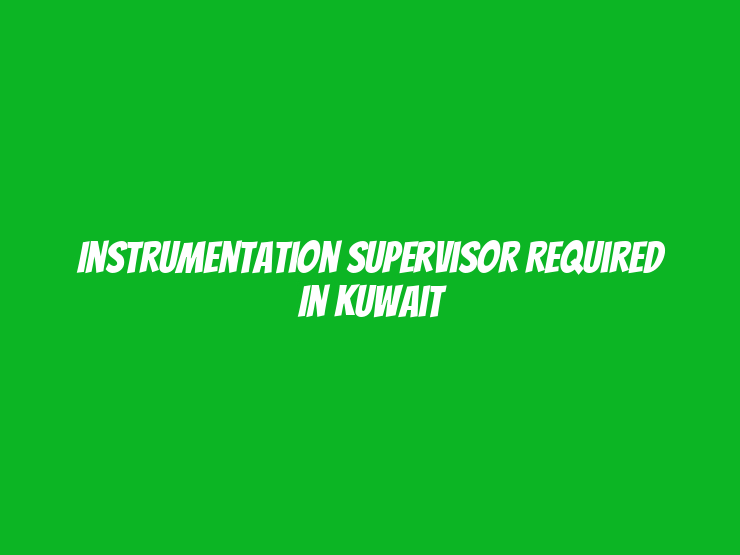An Instrumentation Supervisor is responsible for overseeing the installation, maintenance, and repair of instrumentation and control systems in industrial facilities. These systems are critical for monitoring and controlling various processes in industries such as oil and gas, manufacturing, power generation, and chemical processing. The role involves managing a team of technicians, ensuring that all instrumentation equipment is functioning correctly, and adhering to safety and operational standards. An Instrumentation Supervisor plays a vital role in ensuring the reliability and efficiency of automated systems that keep industrial operations running smoothly.
| Salary | Market Competitive |
| Experience | 10 – 20 years |
| Location | Kuwait |
| Qualification | Basic |
| Posted | 23 October 2024 |
| Job Type | Full-Time |
| Posted by | Habeebi Recruiter |
| last date to apply | apply within 15 days |
Key Responsibilities of an Instrumentation Supervisor
1. Supervision of Installation and Maintenance Activities
A primary responsibility of the Instrumentation Supervisor is to oversee the installation, calibration, and maintenance of instrumentation systems. This includes supervising technicians as they install new sensors, transmitters, control valves, and other critical components. The supervisor ensures that these systems are installed in compliance with technical specifications and industry standards. In addition, they manage routine maintenance schedules to keep the equipment running efficiently and prevent any unexpected downtime.
2. Troubleshooting and Repair of Instrumentation Systems
Instrumentation Supervisors are responsible for diagnosing and resolving issues with instrumentation and control systems. When equipment malfunctions or experiences performance issues, the supervisor leads troubleshooting efforts to identify the root cause of the problem. They may also guide the repair or replacement of faulty components to ensure minimal disruption to the industrial processes. The supervisor’s expertise in control systems and instrumentation ensures that any issues are resolved quickly and efficiently.
3. Team Management and Coordination
A key aspect of the role is managing a team of instrumentation technicians, providing them with guidance and support. The Instrumentation Supervisor is responsible for assigning tasks, setting priorities, and ensuring that the team meets project deadlines and maintenance schedules. This also involves mentoring and training junior technicians, ensuring they have the skills and knowledge required to handle complex instrumentation tasks. By maintaining a well-coordinated team, the supervisor ensures that all instrumentation-related work is carried out safely and efficiently.
4. Ensuring Compliance with Safety and Quality Standards
Instrumentation Supervisors must ensure that all work performed by their team complies with safety regulations and quality standards. In industrial settings, the safety of workers and the integrity of equipment are paramount. The supervisor is responsible for enforcing safety protocols, ensuring that all personnel use protective equipment, and verifying that all instrumentation systems are installed and maintained according to operational safety standards. This role also includes conducting regular safety audits and inspections to ensure compliance with industry and company policies.
5. Instrumentation System Upgrades and Modifications
As technology advances, Instrumentation Supervisors are often tasked with overseeing system upgrades or modifications to improve efficiency, accuracy, or safety. This involves assessing current instrumentation systems, recommending upgrades, and managing the installation of new technologies. By staying updated with the latest advancements in instrumentation and control systems, the supervisor helps ensure that the facility operates with modern, reliable equipment, which can lead to improved process control and reduced operational costs.
6. Monitoring and Performance Reporting
Another important responsibility of an Instrumentation Supervisor is to monitor the performance of instrumentation systems and maintain detailed records. This includes ensuring that control systems are operating within specified parameters and providing data on system performance. The supervisor is often responsible for generating reports that provide insights into system efficiency, any malfunctions encountered, and the effectiveness of maintenance activities. These reports are used by management to make informed decisions about process improvements and future investments in instrumentation systems.
7. Coordination with Other Departments
The Instrumentation Supervisor works closely with other departments, such as operations, maintenance, and engineering teams, to ensure that instrumentation systems support overall operational goals. For example, they collaborate with the operations team to ensure that control systems are aligned with production needs, or they may work with the engineering department to integrate new instrumentation into larger projects. Effective communication and coordination with other teams are essential for ensuring that instrumentation systems meet the facility’s requirements and contribute to its productivity.
Skills and Qualifications
To be successful in the role of an Instrumentation Supervisor, one must have extensive knowledge of instrumentation and control systems, including the principles of measurement, control, and automation. A strong understanding of electrical systems, process control, and safety regulations is also critical. Instrumentation Supervisors typically have a background in electrical engineering, instrumentation technology, or a related field, along with several years of hands-on experience working with industrial control systems.
In addition to technical expertise, strong leadership and communication skills are essential for managing a team and coordinating with other departments. Problem-solving abilities, attention to detail, and a commitment to safety and quality are also key traits for this role. Supervisors may also need to stay current with industry certifications and safety training to ensure compliance with regulations.
In summary, an Instrumentation Supervisor plays a crucial role in maintaining and optimizing the performance of instrumentation systems in industrial settings. Through effective supervision, troubleshooting, and compliance with safety standards, they help ensure the smooth and efficient operation of critical processes.
How to apply:
Send your updated resume to our email or directly reach us at our phone:
Email: sitikantha.sahoo@petroexceltech.com
Phone: +7749071701

